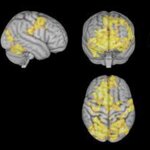
Puberty is the defining process of adolescent development and it leads to variety of changes throughout the body - even including the brain.
Writing in
in Proceedings of the National Academy of Science (PNAS), researchers find that cerebral blood flow (CBF) levels decreased similarly in males and females before puberty, but then diverge sharply in puberty, with levels increasing in females while decreasing further in males, which could give hints as to developing differences in behavior in men and women and sex-specific pre-dispositions to certain psychiatric disorders.
"These…


